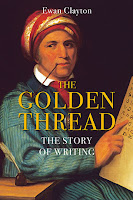 Staff Review by Chris Saliba
Staff Review by Chris SalibaFormer monk and Xerox corporation consultant Ewan Clayton provides a detailed and scholarly history of writing, from the ancients right up to the digital revolution of today. He shows how writing has evolved and its power to change the world.
Ewan Clayton has an interesting personal history. In his twenties, after a serious illness, he decided to enter a monastery and stayed on for four years, first as a layman and then as a monk. When he left the monastery in the late 1980s, he was hired as a consultant to Xerox PARC, the Palo Alto Research Centre of the Xerox corporation. This was the laboratory where much of the nascent computer and internet technology was invented, with concepts such as Windows and the laser printer. One of the stand out achievements of Clayton's history of writing, The Golden Thread, is how it seamlessly fuses the information revolution of today to writing's long history. He sees information technology as one form of communication amongst many; not a clear break with the past but a continuation of it.
The Golden Thread starts with the ancient Romans and Greeks, then moves onto the early Christian era (it was Christians who popularised the codex, an early form of today's paper books). The middle part of the book examines the proliferation of printing that came with the invention of the Gutenberg press in the sixteenth century. The final major change that is documented is the rise of the internet and information technology.
This is a carefully written history that positions writing as a primarily human and sensuous practice. Clayton reminds us in his detailed descriptions how beautiful books can be. The medieval hand written bibles, with their huge labour inputs, are major works of art in themselves. His historical perspective also demonstrates that writing's history doesn't have cut off points where one technology is discarded and another taken up. When the Gutenberg press really took off and cheaper books flooded Europe, it didn't have that much of an impact on hand written books in general. Both lived side by side. Hand written books still had their purpose to fulfill. It's also interesting to note the enormous contribution writing made to the rise of capitalism. The shared memory that writing provided, best put to use in company documents and double entry accounting, allowed mercantile culture to flourish.
The book finishes with a dramatic example of why Ewan Clayton thinks handwriting will survive digitisation. He writes that immediately following the 9/11 terrorist attacks people started sticking hand written notes and signs everywhere. The streets were awash in paper. Their presence proved paper's more urgent and human powers of communication. This is the sort of book that will cause a double-think of a simply technology that has always been taken for granted, highlighting how powerful a medium the written word is.
The Golden Thread: The Story of Writing, by Ewan Clayton. Published by Atlantic. ISBN: 9781848873636 RRP: $22.99
To sign up for our monthly newsletter, featuring new releases, book reviews and favourite articles from around the web, click here.
No comments:
Post a Comment